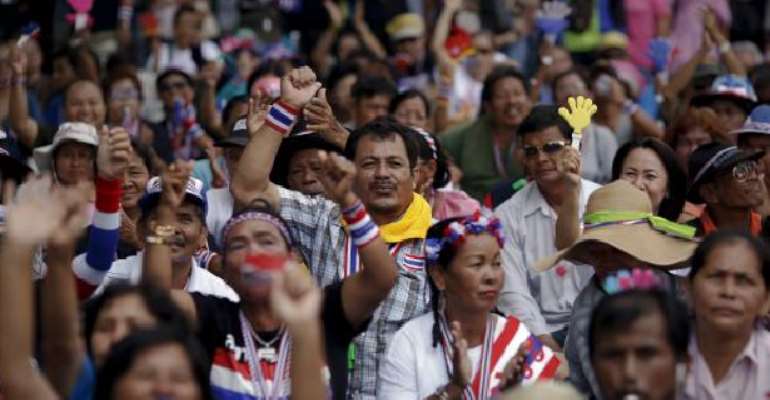Rice Farmers Protest As Thai Government's Funding Woes Mount

More than 1,000 farmers protested outside the Thai government's temporary headquarters on Monday over the state's failure to pay for rice bought under a subsidy scheme that the caretaker administration admits it is struggling to fund.
The rice program was a signature policy of Prime Minister Yingluck Shinawatra, who was swept to power in 2011 with the help of millions of rural votes, but has become one of the biggest threats to her grip on power.
Troops stood guard behind a barbed wire fence at the Defence Ministry offices in northern Bangkok that have been Yingluck's base since a campaign by anti-government protesters to disrupt normal business in the capital forced her to relocate in January.
"Don't cheat farmers, Yingluck.
If you can't administer the country then get out because there are plenty of capable people willing to govern," one farmer shouted through a loudspeaker.
The anti-government protesters trying to drive Yingluck from office since November have found much of their support from middle-class, urban taxpayers appalled at what they see as corruption and waste in the rice scheme.
About 30 representatives of the farmers were allowed inside to meet Commerce Minister Niwatthamrong Bunsongphaisan and Finance Minister Kittirat Na-Ranong, but left after less than half an hour telling reporters there had been no progress.
"We will not put up with this any longer," said Kittisak Ratanawarahal, president of the Network for Northern Farmers.
"We will seize government rice warehouses around the country so that the government can't swindle us anymore.
" LIMITED POWERS Yingluck has led a caretaker administration since December, when she dissolved parliament and called a snap election in an attempt to end the street protests, the latest installment in eight years of on-off political turmoil that began with the ousting of her brother, Thaksin Shinawatra, in a 2006 coup.
Disruption to a February 2 general election prevented voting from being completed everywhere, meaning the government remains a caretaker administration with limited spending powers until the vacant seats in parliament can be filled.
That could take months, with the political paralysis taking an increasing toll on an already flagging economy.
The government lacks the power to transfer money from the central budget to pay for the rice it has committed to buy from farmers, some of whom have not been paid for months.
Big banks have refused to offer bridging loans, unconvinced the government has the authority to seek them.
Commerce Minister Niwatthamrong told the farmers leaders' that the government had tried to borrow money from several banks over the past two weeks to pay the farmers but was refused, according to a Reuters reporter present.
"We are doing everything in our power .
.
.
but none of them will release funds.
There are groups intimidating these banks into not helping us," the minister said.
SPORADIC CLASHES Ten people have been killed in sporadic clashes since the Bangkok protests began in November, although the last week has been quieter with numbers at demonstrations dwindling.
There was a reminder of the potential for violence on Monday, however, when a crude "ping pong" bomb exploded wounding six city workers, two seriously, who had been cutting trees near Phan Fa Bridge in the city's historic quarter.
"We cannot yet conclude whether the device was intended to hurt protesters.
It could have been hidden there for weeks," said Nopparut Chitman, a police officer in charge of the case.
Rice farmers have until now been natural supporters of Yingluck and her brother, Thaksin, who raised living standards in the countryside with populist policies such as cheap healthcare when he was prime minister from 2001.
But the former telecoms tycoon ran up against opposition from the royalist establishment and the army.
The farmers have kept their distance from the broader protest movement, whose leaders have been seeking to make common cause with them.
Protest leader Suthep Thaugsuban led a march from Bangkok's central business district to the upscale Thonglor and Ekkamai neighborhoods on Monday to collect donations for the farmers.
"We are not yellow and we are not red," said a sign held up by one farmer, referring to Thailand's color-coded political divide.
"We are only here to remind you about our rice.
" REUTERS
